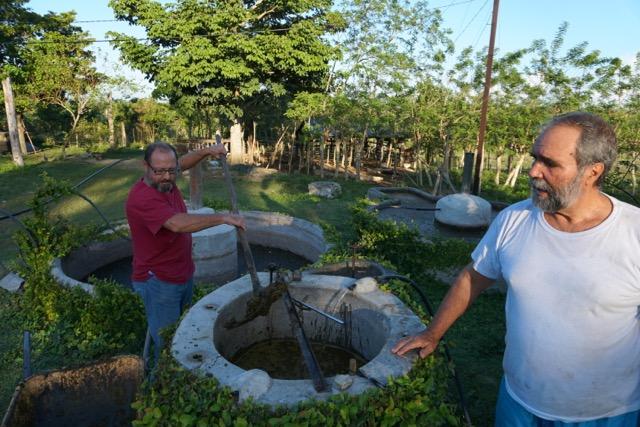Re-cycling of biomass nutrients and carbon for advanced organic fertilization in an eco-smart and climate positive agriculture on Cuba (Bio-C)
This project combines the recycling of waste material with the production of food, feed, and bio-based energy in the context of Cuba, a country that progresses like only a few others towards a more sustainable and increasingly organic agriculture.
About the project
Background
While Cuba progresses like only a few other countries towards a more sustainable and increasingly organic agriculture, the amounts of recyclable organic nutrients to fertilize the crop fields are limited. To close the organic nutrient cycles and guarantee sufficient fertilization for higher crop productivity, the methods and technologies to transform a large spectrum of biomass into organic fertilizers have to be optimized. Composting and anaerobic digestion (AD) technologies produce currently most of the organic fertilizing substrates for Cuba, however, nutrient and carbon losses through leaching and greenhouse gas emissions are considerable. To reduce these losses and optimize the processes, Bio-C intends to introduce pyrolysis as a third, complementary key biomass-transforming technology. Besides green energy, the main product of pyrolysis is biochar, a highly porous material with high adsorption and nutrient exchange capacities, high water holding and redox potentials. These properties make it a versatile material to reduce organic nutrient losses especially in composting, AD, and animal farming. Moreover, the carbonaceous matrix of biochar can be impregnated with liquid nutrients (e.g. animal urine, liquid digestate, fermented sugar cane bagasse) upgrading the biomaterial to a potent organic slow release fertilizer. Advanced organic biochar based fertilizers are expected to be more nutrient effective, crop yield and plant health enhancing and ecologically sensitive than conventional fertilizers.
The project nexus combines the recycling of waste material with the production of food, feed, and bio-based energy.
Objectives
As an emerging economy, Cuba is an example not only for the Caribbean but for many developing countries in the tropics and subtropics. If Cuba succeeds in transforming an increasing part of its agriculture to organic fertilization, it would serve as an impressive role model for countries suffering economic and environmental pressures related to soil degradation, agro-chemical imports, and climate change.
All of the following objectives contribute to the long-term goal of minimizing negative impacts of agriculture to the ecosystems and to the climate.
- To optimize existing biomass technologies (AD, bio-diesel, composting, and pyrolysis) in regard to nutrient and carbon efficiency, greenhouse gas emissions, ecosystem services, carbon sequestration and energy production.
- To develop optimal organic nutrient enrichments of biochar to increase sustainable crop production.
- To determine the effect of biochar based fertilizer and substrates on soil and plant health, including the mechanism underlying various pest-plant interactions.
- To assess the long-term effect of repeated root zone application of biochar based fertilizers.
- To investigate the effects of biochar feed additives for pig breeding in a large-scale veterinary trial under highly controlled conditions.
- To calculate the national nutrient and carbon cycling potential for countrywide sustainable farming.
Making organic waste a valuable resource for soil improvement and increased productivity by recycling and cascading applications, and thereby augmenting food supply and environmental resilience, is the nexus of most goals of the BioC-project.
Relevance
By augmenting and optimizing the recycling of local organic wastes in Cuba, Bio-C leads to better nutrient recycling, improved soil quality, increased crop yield and quality, to improved climate change resilience and a reduced carbon footprint. We hope to succeed with Bio-C to provide the scientific and technical base for both, farmer and policy maker, to progress towards a more efficient use of biomass for nutrient cycling, carbon sequestration, ecosystem services in addition to the mainly energy driven use of today. Thanks to the strong scientific network and multidisciplinary approach we hope not only to demonstrate the efficiency of a new technology or method, but to reveal the mechanisms and better understand its functions, to develop and further optimize, and, of utmost importance, to assess the long-term effects and limit any potential risks. Only on that basis, will the Bio-C concept be ready for large scale implementation into practice and to be set into policy recommendations.
Bio-C impact is mainly expected on the following two levels:
- Scientific evidence and research based solutions for reducing poverty and global risks are provided by closing biogenic waste stream cycles, optimizing nutrient availability, soil quality and crop yield, thereby contributing to improved food security, farmer livelihood and ecosystem services.
- Stakeholders are informed about methods and integrated approaches to tackle problems by means of large scale farmer trials, farmer exchange, regional and national workshops, and media activities.
Geographic scope
- Cuba
Project link to P3
- Link to project on SNSF research database P3

